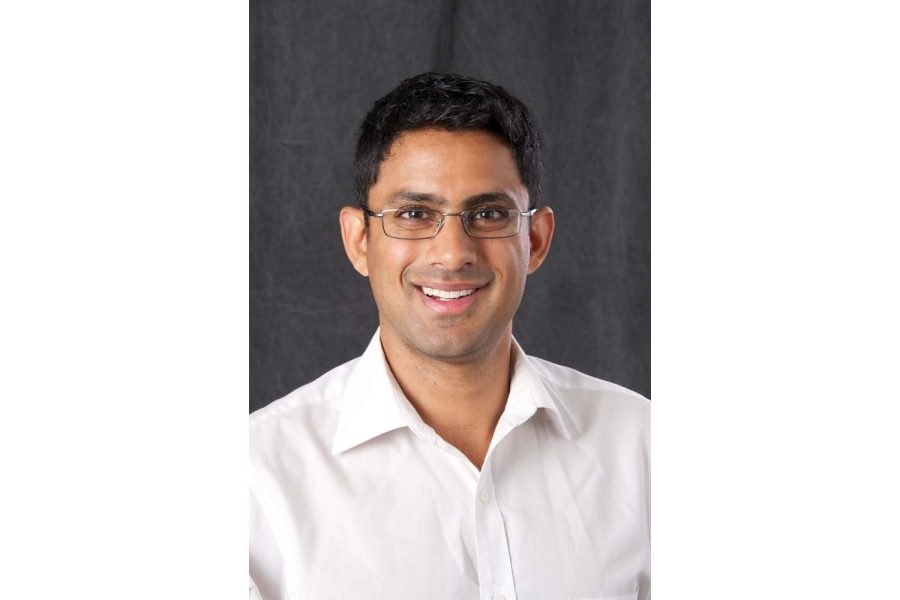New Iowa Center for Neurodegeneration aims to unite researchers against neurodegenerative diseases
The center, established by University of Iowa Health Care, is for researchers to begin treatments for neurodegenerative diseases, such as Alzheimer’s and Parkinson’s.
University of Iowa Associate Professor of Neurology Nandakumar Narayanan poses for a portrait. (Contributed)
November 16, 2021
Researchers from the University of Iowa Roy J. and Lucille A. Carver College of Medicine are already congregating on the fifth floor of the Pappajohn Biomedical Discovery Building as members of the new Iowa Center for Neurodegeneration.
The center was approved by the state Board of Regents Academic Affairs Committee on Nov. 3, as previously reported by The Daily Iowan.
The new center, established by UI Health Care this year, will work to fight neurodegenerative diseases such as Alzheimer’s disease, Parkinson’s disease, Lewy Body Dementia, Frontotemporal Dementia, and Amyotrophic Lateral Sclerosis, or ALS. These diseases are increasingly impacting the elderly population in Iowa, Nandakumar Narayanan, UI associate professor of neurology said.
The center will receive $25,000 annually from the Sitz Foundation and $15 million in direct costs from National Institutes of Health grants, according to the initial request from the UI. It is meant to bring world-class researchers to Iowa to find novel treatments.
Narayanan studies Parkinson’s disease and is a participant in the new center.
“Our hope is to recruit national leaders in neurodegenerative diseases to Iowa and that the center catalyzes existing resources and efforts on campus towards new diagnoses and therapies,” Narayanan said.
Georgina Aldridge, UI assistant professor of neurology, said Iowa has not had a center focused on neurodegeneration before, despite having a large population of patients with those diseases.
“And yet, the University of Iowa has amazing and talented researchers that are all studying different aspects of these things, and the center is going to bring us all together,” Aldridge said.
Alzheimer’s disease, the most common neurodegenerative disease, affects one in 10 people aged 65 and older in the U.S.
About 14 million people are expected to have the disease by mid-century, according to a fact sheet from the Alzheimer’s Impact Movement.
Initiatives like the Center for Neurodegeneration are answers to this bolstering population, Narayanan said.
Both Aldridge and Narayanan said the center will not require many new resources but will use existing resources more efficiently. Aldridge said the new Iowa Brain Bank is an example of such a resource, as the Iowa Center for Neurodegeneration will provide a system by which patients can send brain tissue to researchers.
Narayanan said he sees potential in the center to create new methods of treating neurodegenerative diseases.
“One thing that we’re really excited about is the role of energy in neurodegenerative disease, so we could imagine developing new tools to measure metabolism via MRI or via our existing metabolomics core,” he said.
Michael Welsh, a UI professor of internal medicine, said neurodegeneration is currently one of the biggest biomedical challenges, comparable to cancer, and there is no known way of stopping it.
“I think that’s what’s exciting here is the mixing together of people who are taking care of humans who have these diseases, and people who are working to try and understand it,” Welsh said.
Narayanan said the center will build on the UI’s already impressive track record of neurological achievements.
The UI is “a little bit undersold” for its role in fighting neurodegenerative diseases, he said, as the university has the third oldest neurology department in the nation, is a Parkinson’s Clinical Center of Excellence, and a leading center for ALS research.
“What we hope this center does by bringing together these resources is that people recognize our clinical leadership and that we’re able to piggyback on this clinical leadership for both clinical and translational research as well as basic science research,” he said.
Welsh said he is confident the center is a step toward making breakthroughs in treating neurodegenerative diseases.
“I want some real treatments for these diseases,” Welsh said. “I’m tired of not being able to do more for the people who suffer from these. I want us to know the causes better and to be able to treat those, and I think this center is going after that.”



